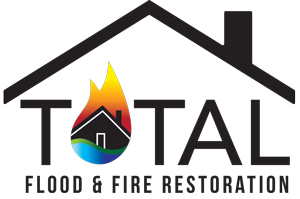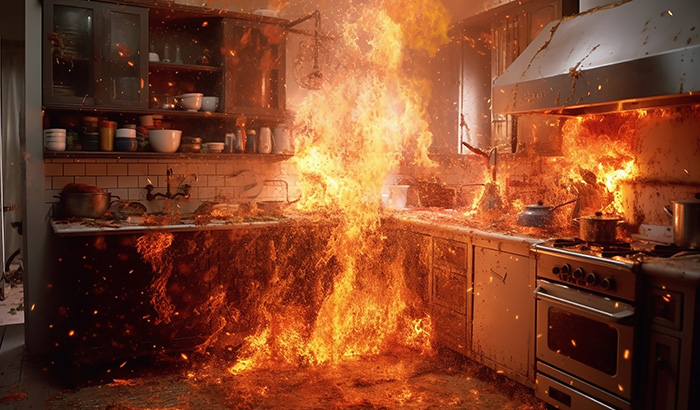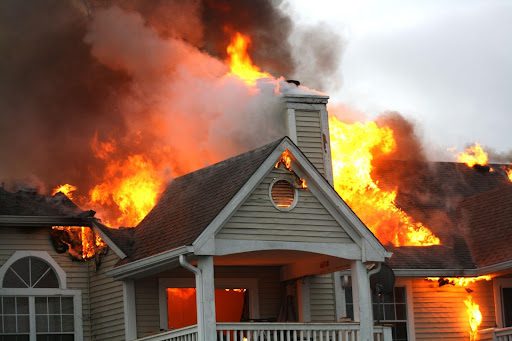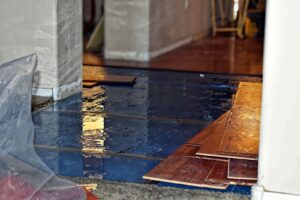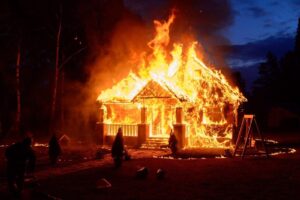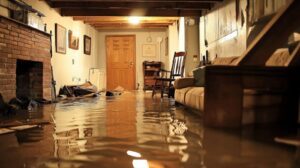The immediate aftermath of a house fire is a chaotic and distressing time, marked by a mix of shock, loss, and urgency to address the situation.
You’re evacuated from your home to keep you and your family safe. Firefighters have arrived to extinguish the fire. Paramedics tend to injured individuals, providing first aid and transporting those needing medical attention to the hospital.
It’s not uncommon to feel various emotions, none of them good, after a fire. Following that immediate shock, the firefighters and other officials will assess the fire damage to determine what caused it and ensure no hazards remain. That includes checking the structural integrity of your home to see if it’s safe for you to re-enter it.
It’s a lot to handle, and understandably so. And while there’s a list of things you can do after a fire, there’s also a list of things you shouldn’t do to keep you and your family safe and to help with the insurance claims process. Let’s take a closer look.
6 Things to Avoid After a House Fire
1. Don’t Enter the House Prematurely
As much as you might want to see how bad the damage is, it’s really important not to enter your home too soon, as this could pose serious risks to your safety. Here’s why entering prematurely after a house fire is dangerous and should be avoided.
- Structural instability: It’s possible for the fire damage to compromise the structural integrity of your home, making it unsafe to enter. There is a risk of collapse or falling debris.
- Remaining fire and hot spots: There might be unseen hot spots or smoldering embers that could reignite, posing a risk of another fire outbreak.
- Toxic fumes and smoke: The air inside could be contaminated with toxic fumes, smoke, and particulates from burnt materials, which can be harmful if inhaled.
- Electrical hazards: There could be damaged electrical wiring, which poses a risk of electrocution.
- Water and slip hazards: Water used to extinguish the fire can mix with debris, creating slippery and hazardous conditions.
- Chemical reactions: Some household materials can produce hazardous chemical reactions when burned or exposed to water.
- Impeding investigations: Entering prematurely can disturb the scene, potentially complicating investigations into the cause of the fire and the assessment of damages.So, when can you re-enter your home? Wait for clearance from the fire department and other officials, and be sure to wear protective gear.
2. Don’t Avoid Notifying Your Insurance Company
It’s important to immediately inform your insurance company after the fire, or you risk not having the fire covered – partially or entirely. Here’s why it is essential to promptly inform your insurance company about the fire:
- Policy requirements: Most insurance policies require policyholders to report losses promptly. Not immediately reporting the fire could violate the terms of the policy and result in your claim being denied.
- Claim processing: The sooner you tell the insurance company, the sooner they can start processing your claim. Delaying notification often results in prolonged claim processing times, delaying the financial assistance you need for repairs and recovery.
- Evidence and documentation: Immediately notify your insurance company, allowing the insurance adjuster to quickly come to the scene of the fire and assess the damage while the evidence is still fresh.
- Temporary living expenses: Many insurance policies cover temporary housing and living expenses if your home is uninhabitable. Notifying them promptly means you access those benefits sooner.
- Mitigating further damage: Your insurance company can guide you on what steps to take to prevent further damage. This might involve boarding up windows or covering damaged roofs. They might also help arrange emergency repairs.
- Legal and liability issues: There could be legal implications if the fire affects neighboring properties or causes injury. Your insurance company can help with this.
- Preserving policy rights: Timely reporting preserves your rights under the policy and ensures that you fulfill your duties as a policyholder, avoiding disputes with the insurance company later on.
- Emotional support and counseling: Some insurance policies offer support services, including counseling, to help policyholders cope with the trauma and stress following a fire.
3. Don’t Try to Clean Up Yourself.
Attempting to clean up by yourself after a fire is not advisable due to the numerous risks and challenges involved. Here are several reasons professional assistance is crucial and why you should avoid self-cleaning.
- Exposure to hazardous materials: Fires can release toxic substances from burnt materials. Without proper protective equipment, cleaning up can expose individuals to harmful chemicals, soot, and ash, leading to health issues.
- Inadequate equipment and knowledge: Professional cleaning services have specialized equipment and knowledge to effectively remove soot, ash, and smoke damage. Attempting to clean without the proper tools and expertise can lead to incomplete and ineffective cleaning.
- Water damage and mold growth: Water used to extinguish the fire can lead to water damage and mold growth if not properly addressed. Professionals can properly dry out and dehumidify the area to prevent mold development.
- Inhaling smoke particles: Inhaling residual smoke particles leads to respiratory problems. Professional cleaners use appropriate respiratory protection and air filtration devices to mitigate this risk.
- Impaired judgment: Emotional distress and trauma following a fire can impair judgment and decision-making, leading to mistakes and oversights during cleanup.
- Insurance claim complications: Improper cleanup can complicate insurance claims. Insurance companies may require professional assessments and restoration services to validate claims.
- Preserving evidence: Early cleanup might disturb the evidence needed to determine the fire’s cause, which can be crucial for insurance and legal purposes.
- Loss of valuables: Professionals can help salvage and restore valuables and important documents, reducing the overall loss.
4. Don’t Avoid Documentation
Avoiding documentation after a house fire can have serious repercussions, particularly regarding insurance claims and legal matters. Here’s why documentation should not be avoided and is crucial in the aftermath of a fire:
- Insurance claims: Documentation is vital for substantiating insurance claims. Without proper documentation, it might be hard to prove the extent of your loss, leading to potential disputes and delays in claim settlements.
- Accurate compensation: Having detailed records and documentation matters when it comes to being compensated for damaged items, property conditions, and other incurred expenses.
- Legal protection: If you have a dispute with your neighbor or a liability claim, thorough documentation will likely serve as essential evidence to support your case.
- Tax deductions: Losses from a fire may qualify for tax deductions. Proper documentation is required to support any deductions claimed on tax returns.
- Recovery and restoration: Documentation helps create an inventory of lost or damaged items, helping the recovery and restoration process and identifying items that need replacement or repair.
- Memory recall: The trauma and stress following a fire can impact memory recall. Having documented evidence helps in recalling the details accurately during the recovery process.
- Rental or lease agreements: For those who are renting or leasing, documentation is crucial for resolving any disputes with landlords or property management regarding responsibilities and liabilities.
- Assistance programs: Some assistance programs require documentation of loss and damages as part of the application process for aid.
5. Don’t Discard Damaged Items
For the sake of insurance claims, fire damage restoration, and investigations, don’t throw out any damaged items, even if you think the damage is irreparable.
- Insurance claims: Damaged items serve as evidence for insurance claims. Discarding them prematurely can lead to disputes and difficulties substantiating the claims, potentially reducing compensation.
- Value assessment: Insurance adjusters need to assess the extent of the damage to each item to determine its value accurately. Discarding items can prevent a proper assessment, leading to undervaluation.
- Claim verification: Insurance companies may require physical verification of damaged items to validate the claims made. Without the damaged items, verification becomes impossible, complicating the claim process.
- Salvage and restoration: Some items may appear damaged but can be cleaned, restored, or repaired. Discarding them prematurely can lead to unnecessary loss of valuables and possessions.
6. Don’t Neglect Safety Inspections
Safety inspections are critical to ensuring that your home truly has been restored after the house fire. This involves your home’s structural integrity, hidden damage, electrical hazards, gas leaks, and more.
- Hidden damages: Inspections can uncover hidden damages that are not immediately visible, such as damage to internal structures, wiring, plumbing, and foundations, preventing unforeseen accidents and failures.
- Gas leaks: Fires can damage gas lines, leading to leaks that pose explosion and asphyxiation risks. Safety inspections can detect gas leaks and facilitate immediate repairs.
- Toxic contamination: Fires can release toxic substances from burnt materials. Inspections can identify areas contaminated with toxic residues, ensuring proper cleanup and decontamination.
- Fire safety measures: Post-fire inspections can identify deficiencies in fire safety measures and recommend improvements to prevent future fires, enhancing the overall safety of the property.
Fire Damage Restoration With Total Flood and Fire Restoration
Recovering from a house fire can be overwhelming, but you don’t have to navigate this challenging time by yourself.
For professional, empathetic, and efficient fire damage restoration services, contact Total Flood and Fire Restoration. We specialize in helping you restore normalcy and peace of mind by addressing all aspects of fire damage with utmost precision and care.
Call 385.503.2572 or fill out the form on our website to schedule your fire damage restoration today.
